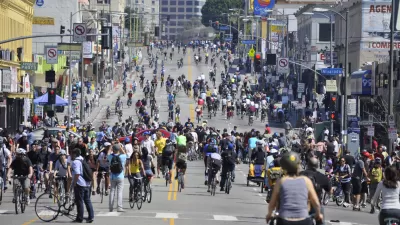NRDC land use expert Amanda Eaken blogs about the approval by the Air Resources Board of the regional targets required by SB 375 to reduce global warming caused by transportation. An overlooked result may be the new powers resting with MPOs.
Amanda Eakin participated in the SB 375 Regional Targets Advisory Committee that provided "recommendations on factors to be considered and methodologies to be used in the ARB target setting process". She is considered one of the authorities on SB 375 process.
"Now that the Air Board has set the targets, the regional agencies will use their existing regional transportation planning processes to select the strategies most appropriate to their regions to meet their targets.
Toward the end of the discussion, CARB Boardmember and Mayor of Riverside Ron Loveridge commented on what may be one of the most significant impacts of law to date:
"The 21st Century is a century of regions. SB 375 is the first time in my political lifetime that we've had a serious regional conversation about urban form."
From San Francisco Chronicle:
"The board adopted different targets for different areas of the state, with the first coming in 2020 and the second in 2035. For the Bay Area, the targets are a 7 percent reduction by 2020 and a 15 percent reduction by 2035.
The targets adopted by the board for the Los Angeles region were higher than the planning body there had called for, though the numbers will be re-evaluated. Officials with the Southern California Association of Governments had asked for a 6 percent reduction by 2020 and 8 percent by 2035, but the air board approved 8 percent by 2020 and 13 percent by 2035."
Thanks to Climate Plan
FULL STORY: California Air Board Votes to Cut Traffic and Clean the Air

Trump Administration Could Effectively End Housing Voucher Program
Federal officials are eyeing major cuts to the Section 8 program that helps millions of low-income households pay rent.

Planetizen Federal Action Tracker
A weekly monitor of how Trump’s orders and actions are impacting planners and planning in America.

Ken Jennings Launches Transit Web Series
The Jeopardy champ wants you to ride public transit.

Rebuilding Smarter: How LA County Is Guiding Fire-Ravaged Communities Toward Resilience
Los Angeles County is leading a coordinated effort to help fire-impacted communities rebuild with resilience by providing recovery resources, promoting fire-wise design, and aligning reconstruction with broader sustainability and climate goals.

When Borders Blur: Regional Collaboration in Action
As regional challenges outgrow city boundaries, “When Borders Blur” explores how cross-jurisdictional collaboration can drive smarter, more resilient urban planning, sharing real-world lessons from thriving partnerships across North America.

Philadelphia Is Expanding its Network of Roundabouts
Roundabouts are widely shown to decrease traffic speed, reduce congestion, and improve efficiency.
Urban Design for Planners 1: Software Tools
This six-course series explores essential urban design concepts using open source software and equips planners with the tools they need to participate fully in the urban design process.
Planning for Universal Design
Learn the tools for implementing Universal Design in planning regulations.
Ada County Highway District
Clanton & Associates, Inc.
Jessamine County Fiscal Court
Institute for Housing and Urban Development Studies (IHS)
City of Grandview
Harvard GSD Executive Education
Toledo-Lucas County Plan Commissions
Salt Lake City
NYU Wagner Graduate School of Public Service





























